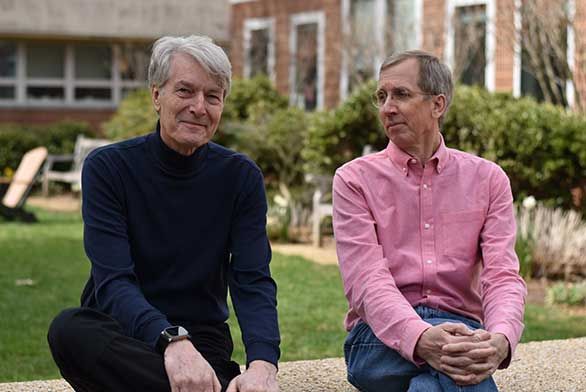Johnnies in Tech: Alum-Founded Startup New Sapience Offers Annapolis Students a Crash-Course in AI
January 24, 2024 | By Kirstin Fawcett (AGI26)
Like many St. John’s students, Isaac Boone (A26) was initially wary of artificial intelligence, or AI. He worried about its ethical implications, whether it posed a potential threat, and how it should be regulated. But being a Johnnie, he also knew better than to run in the other direction when faced with tough questions. When Bryant Cruse (A73) and Tom Loveland (A84) came to campus last spring to give a talk on AI and recruit summer interns for New Sapience, their Annapolis-based AI startup, Boone decided that working directly with them as a Hodson intern might assuage his doubts—or, at least, provide him with clarity on AI’s future.

New Sapience is a different kind of AI company than the machine-learning types you’ve probably read about in the news. For one, it’s the brainchild of Cruse, the company’s founder and CEO—a Johnnie whose philosophy background has been equally as important to the company’s development as his technological credentials.
Cruse holds a graduate degree in space systems engineering from Johns Hopkins and worked for Lockheed Martin, where he developed nascent AI technology for the Hubble Telescope and received NASA funding for an AI residency at the Lockheed AI Center. He went on to build and sell two software automation companies before launching New Sapience in 2015. But it was at St. John’s College where Cruse first began exploring questions of epistemology, or what it truly means to know something; these ideas coalesced as he began brainstorming the prototype for an emerging patented technology he calls “synthetic intelligence.”
What sets synthetic intelligence apart from its competitors, according to those who work for New Sapience, is that programs like ChatGPT are “generative artificial intelligence; they combine words based on likelihood, not based on an understanding of what the words are to form cohesive sentences,” Boone explains. Synthetic intelligence, on the other hand, is intended to imbue devices with a comprehensive worldview. It doesn’t pantomime intelligence—it is intelligent, providing machines with a human-like ability to reasonably converse. But to develop synthetic machine intelligence, one must first ask a very Johnnie-esque question: What is intelligence?
That’s where Cruse’s philosophy background kicks in. “Intelligence is what makes us humans different from other species,” Cruse says. “It’s our distinguishing characteristic. We’re the only species that adapt our environment to ourselves, as opposed to having to adapt to it. So how can we do it? Because we have knowledge of the world; we can predict what will happen; we can envision things. Intelligence is what produces this world model—and if you don’t have a world model and you don’t produce it, you don’t have intelligence.”
That’s why Boone, alongside other New Sapience interns, is hard at work constructing a computerized world model from the ground up. They create kernels of knowledge by modeling concepts and their meanings and associations into software; gradually, these abstractions augment each other and become the scaffolding for informed dialogue. “There are all these concepts,” Cruse says, “and they are made of simpler concepts. And they are all connected.” Ever the Johnnie, he calls this world-building “epistemological engineering.”
Boone’s summer internship with New Sapience was extended into a part-time remote position, providing him with an ever-evolving perspective as the 2024-25 school year progressed. Right now, he no longer views AI as an existential threat; his fears have been replaced with a cautious optimism. “My original position was that we are headed towards the creation of something that’s going to be out of control; that the work that needs to be done is to slow it down in any way possible,” Boone says. He’s learned through his internship that artificial intelligence has its limits; it can’t—and won’t—grow exponentially smarter as is depicted in science fiction books and movies.
Plus, Boone explains, “sapience,” or the ability to exercise knowledge, is a far cry from “sentience,” or the ability to feel and perceive. Machines using synthetic technology will possess the first; not the second. “That fear surrounding artificial intelligence, that it’s going to have its own desires and will, is ill-founded,” Boone says. “[But] you can build something that reasons accurately using real knowledge.”
Potential uses for synthetic intelligence include harnessing it as a memory aid for elderly individuals—it could keep track of their to-do list, for example, or remind them to take their daily medicine—and to provide unbiased recommendations for personal needs such as a new doctor or health regimen. Eventually, the technology could perhaps even be installed inside robotic machines to perform jobs “that have to be done but are tedious and boring, or dangerous and dirty,” Cruse says.
As for Boone, graduation is inching closer, so he’s “thinking about what I want to do with my life; what interests I want to prolong,” Boone says. He is contemplating a career path in technology, or perhaps in AI testing and regulation. And thanks to the Johnnie network, Boone already has a launching pad: he recently accepted a preliminary job offer as a full-time engineer with New Sapience, beginning in May 2026.

